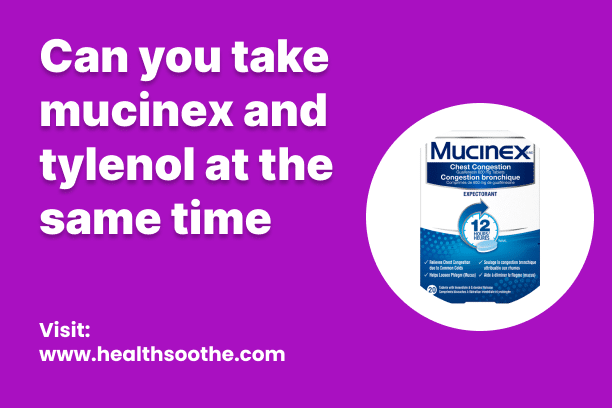“Curious about the safety of combining Tylenol and Mucinex? The answer is generally yes, but there are important factors to consider. Though both can help alleviate cold and flu symptoms, they contain distinct active ingredients designed to address different aspects of illness.
Tylenol, also known as acetaminophen, functions as a pain reliever and fever reducer by inhibiting certain chemicals in the body responsible for pain and fever.
Fortunately, these medications can typically be used together without significant interactions or adverse effects. However, it’s prudent to consult your healthcare provider or pharmacist before combining any medications, especially if you have underlying health issues or are taking other prescriptions.
While Tylenol and Mucinex can be taken concurrently for symptom relief during colds or flu, it’s crucial to adhere to recommended dosage guidelines and seek advice from a healthcare professional if you have any concerns or inquiries.”
Can You Take Tylenol And Mucinex Together
“Many individuals inquire about the compatibility of Tylenol and Mucinex in managing symptoms like fever, pain, and congestion. While I’m not a medical professional, I can offer general insights into the safety of using these medications together.
Read Also: DRUGS FOR TOILET INFECTION IN NIGERIA
Pros and Cons of mucinex and tylenol
Mucinex:
Pros:
- Expectorant
- Symptom Relief
- Over-the-counter Availability
- Different Formulations
Cons:
- Potential Side Effects
- Drowsiness
- Interaction with Other Medications
Tylenol (Acetaminophen):
Pros:
- Pain Relief
- Fever Reduction
- Over-the-counter Availability
- Fast-acting
Cons:
- Liver Damage Risk
- Limited Anti-inflammatory Effects
- Potential Interaction with Other Medications
Differences Between mucinex and tylenol and Promethazine Dm
Mucinex:
Mucinex is commonly used to relieve symptoms of chest congestion and cough caused by colds, flu, or respiratory infections.
Tylenol (Acetaminophen):
Acetaminophen works by inhibiting the production of prostaglandins in the brain, which are involved in the perception of pain and regulation of body temperature.
Promethazine DM:
Promethazine acts as a histamine antagonist, reducing allergy symptoms and suppressing cough reflexes. Dextromethorphan is a cough suppressant that works on the cough center in the brain.
Alternative to mucinex and tylenol
Mucinex (Guaifenesin) Alternatives:
Natural Expectorants: Certain natural remedies like honey, ginger, and hot tea with lemon can act as mild expectorants.
Tylenol (Acetaminophen) Alternatives:
Acetylsalicylic Acid (Aspirin): Aspirin is another option for pain relief and fever reduction, but it should be used cautiously, especially in children and adolescents due to the risk of Reye’s syndrome.
Understanding Tylenol (acetaminophen) and Mucinex:
- Tylenol: This over-the-counter remedy contains acetaminophen, commonly employed to alleviate pain and reduce fever.
- Mucinex: In contrast, Mucinex serves as an expectorant, aiding in the loosening of mucus and phlegm in the respiratory tract.
Combining Tylenol and Mucinex:
- Generally, concurrently taking Tylenol and Mucinex is considered safe.
- However, it’s crucial to carefully review the labels of each product, as they might include additional active ingredients that could interact or cause potential side effects.
- Should you have concerns or inquiries about using both medications simultaneously, consulting a healthcare professional is advisable.
Potential Interactions:
- While there typically isn’t a direct interaction between Tylenol and Mucinex, it’s important to note that both medications can carry their own side effects.
- Acetaminophen (present in Tylenol) poses a risk of liver damage if consumed excessively or combined with alcohol.
- Regarding Mucinex, common side effects may encompass dizziness, nausea, or upset stomach.
Safety Precautions:
- To uphold your well-being when taking Tylenol and Mucinex concurrently:
- Adhere to the recommended dosages for each medication and refrain from surpassing the maximum daily limits.
- If you encounter unexpected or severe side effects, discontinue usage and seek medical attention promptly.
- Inform your healthcare provider about any pre-existing medical conditions or medications you are currently taking.
It’s essential to remember that seeking guidance from a healthcare professional before combining medications is prudent. They can furnish personalized recommendations based on your individual health circumstances.”
Overdose
In case of overdose with serious symptoms such as loss of consciousness or difficulty breathing, call 911 immediately. Otherwise, contact a poison control center without delay. Residents in the US can reach their local poison control center at 1-800-222-1222, while Canadian residents can contact a provincial poison control center. Symptoms of overdose may manifest as nausea, vomiting, loss of appetite, sweating, abdominal pain, extreme fatigue, yellowing of the eyes/skin, dark urine, agitation, confusion, hallucinations, or seizures.
Remember to attend all medical and laboratory appointments.
If you miss a dose and your doctor has instructed you to take the medication regularly, take the missed dose as soon as you remember. If it is close to the time for your next dose, skip the missed one and continue with your regular dosing schedule. Do not double the dose to catch up.
Follow storage instructions provided on the package label, shielding the medication from light and moisture. Avoid storing it in the bathroom. If you have queries about storage, consult your pharmacist. Ensure all medications are kept out of reach of children and pets.
Dispose of medications properly by following guidelines on the package or consulting your pharmacist or local waste disposal company. Do not flush medications down the toilet or pour them into drains unless instructed to do so. Dispose of the product when it expires or is no longer needed.
Drug and food interactions
Drinking alcohol can amplify the nervous system side effects of dextromethorphan, including dizziness, drowsiness, and difficulty concentrating. Some individuals may also notice impaired thinking and judgment. It’s advisable to refrain from consuming alcohol or limit its intake while undergoing treatment with dextromethorphan. Adhering to the recommended dosage of dextromethorphan is crucial, and it’s wise to avoid tasks requiring mental alertness, such as driving or operating machinery, until you understand how the medication affects you. If you have any questions or concerns, don’t hesitate to discuss them with your doctor or pharmacist.
Possible Drug Interactions To Be Aware Of
“Understanding potential drug interactions is crucial when combining medications. If you’re considering taking Tylenol and Mucinex together, it’s important to be aware of possible interactions:
Acetaminophen overdose: Both Tylenol and Mucinex contain acetaminophen, which increases the risk of surpassing the recommended daily dosage when taken together. It’s essential to monitor your intake and avoid other medications or supplements containing acetaminophen.
Liver function: Acetaminophen is primarily metabolized by the liver, and excessive use can strain this organ. Combining Tylenol and Mucinex may further stress your liver, especially if used for prolonged periods or in high doses.
Increased sedation: Mucinex contains guaifenesin, which can induce drowsiness in certain individuals. Taking it with Tylenol may intensify this effect, making tasks requiring focus or alertness more difficult.
Interaction with other medications: Always consult your healthcare provider before combining medications. Certain drugs may interact with Tylenol or Mucinex individually, resulting in adverse effects when used together.
Specific medical conditions: Individuals with pre-existing liver disease or impaired kidney function should use caution when taking both medications simultaneously due to their potential impact on these organs.”
Conclusion
While combining Mucinex and Tylenol may be generally safe for symptom relief, it’s crucial to approach their usage with caution. Understanding the potential interactions, such as acetaminophen overdose, liver function strain, increased sedation, and interactions with other medications, is essential for informed decision-making. Consulting with a healthcare professional before combining these medications is strongly advised, particularly for individuals with pre-existing medical conditions or those taking other medications. By prioritizing safety and seeking expert guidance, individuals can effectively manage their symptoms while minimizing the risk of adverse effects associated with mixing Mucinex and Tylenol.





